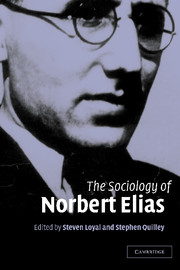Book contents
- Frontmatter
- Contents
- List of contributors
- Acknowledgements
- 1 Towards a ‘central theory’: the scope and relevance of the sociology of Norbert Elias
- Part I Sociology as a human science: Norbert Elias and the sociology of knowledge
- Part II Processes of stratification: figurations of race, class and gender
- 5 Aspects of the figurational dynamics of racial stratification: a conceptual discussion and developmental analysis of black–white relations in the United States
- 6 Decivilizing and demonizing: the remaking of the black American ghetto
- 7 Elias on class and stratification
- 8 Elias on gender relations: the changing balance of power between the sexes
- Part III The formation of individuals and states
- Part IV Religion and civilizing processes: Weber and Elias compared
- Index
- References
7 - Elias on class and stratification
Published online by Cambridge University Press: 22 September 2009
- Frontmatter
- Contents
- List of contributors
- Acknowledgements
- 1 Towards a ‘central theory’: the scope and relevance of the sociology of Norbert Elias
- Part I Sociology as a human science: Norbert Elias and the sociology of knowledge
- Part II Processes of stratification: figurations of race, class and gender
- 5 Aspects of the figurational dynamics of racial stratification: a conceptual discussion and developmental analysis of black–white relations in the United States
- 6 Decivilizing and demonizing: the remaking of the black American ghetto
- 7 Elias on class and stratification
- 8 Elias on gender relations: the changing balance of power between the sexes
- Part III The formation of individuals and states
- Part IV Religion and civilizing processes: Weber and Elias compared
- Index
- References
Summary
Introduction
Unusually for a sociologist, Elias was not prone to extended reflection on the relative theoretical merits of the ‘grand masters’ (although see Elias 1994). Nevertheless, his work does bear the imprint of both Marx and Weber, if less obviously than that of Comte and Durkheim. Like both Marx and Weber, Elias sought answers to rather big historical questions. For all three the origins and development of the patterns of social stratification and class conflict associated with the kind of advanced, capitalist societies found in Western Europe were central theoretical and empirical concerns. Although Elias rarely systematically discussed the concept of class, it nevertheless plays a fundamental role in the analytical rubric of ‘process sociology’. This is clearly the case in his books dealing specifically with processes of stratification – The Established and Outsiders (1994) and The Court Society (1983). It also applies to the more abstract elaboration of the ‘game models’ in What is Sociology? (1978). But, most importantly, in view of the genealogy of his work, class also functions as a central dynamic concept in The Civilizing Process (2000). In this chapter, Elias's processual understanding of class is outlined and compared with the concept of class as it appears in the Marxian and Weberian traditions.
Marx and Weber on class: some shared assumptions
Despite recent flirtations with ‘post-class’ formulations and the relativist and discursive currents associated with late twentieth–century identity politics, class analysis retains a pivotal role in sociological analyses.
- Type
- Chapter
- Information
- The Sociology of Norbert Elias , pp. 122 - 141Publisher: Cambridge University PressPrint publication year: 2004
References
- 9
- Cited by



